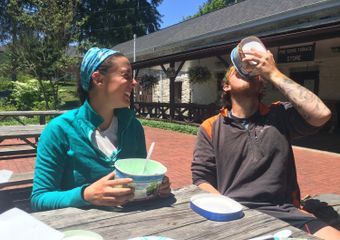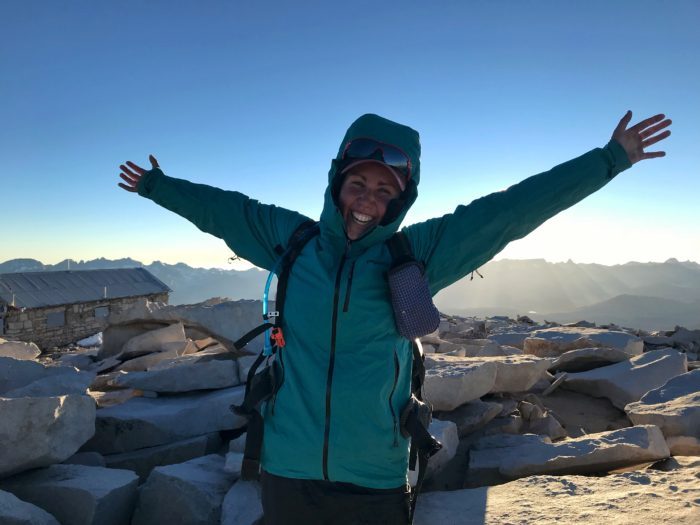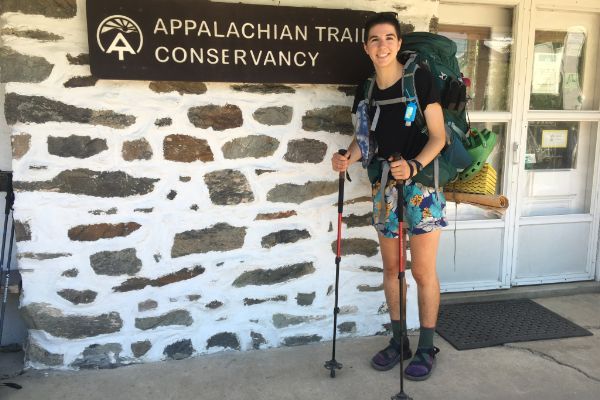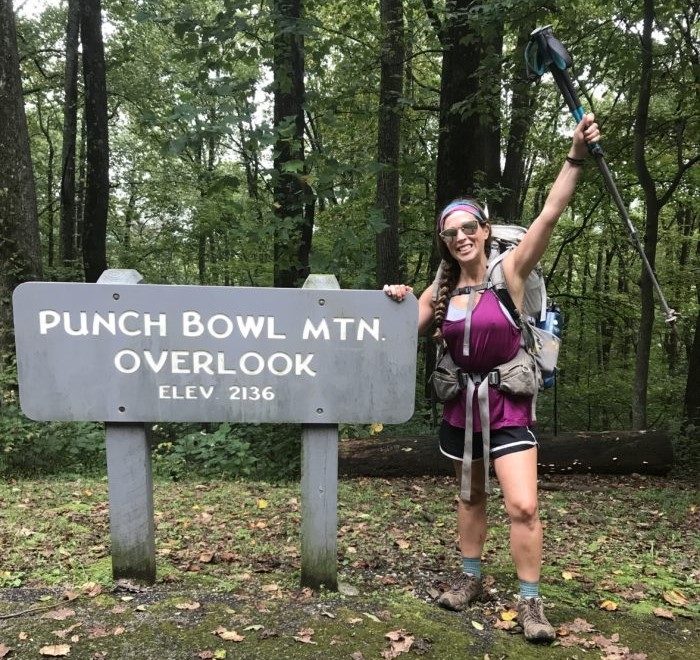Women on Trail: Stories of Courage, Endurance, Empowerment
The numbers are daunting. About 70 percent of AT thru-hikers are men. Mostly twentysomething men. They dominate the shelters, the trail, the culture.
For men and women, hiking more than 2,000 miles is hard enough. But for many women, our challenge begins before we set foot on trail and continues throughout the hike. Our stamina is questioned. We get romantically pursued whether we want it or not. We may be criticized for hiking solo. We get asked if we’re carrying a gun or pepper spray.
If we’re hiking with a male partner, the questions and comments still rain down. “Is he carrying the tent for you?” “You were too scared to do it on your own?” “How much more does his pack weigh than yours?” The most frequent question I received was directed at my partner: “How’d you get her to thru-hike with you?” He would answer the same every time: “This is her dream… I’m just following her.”
Our male-centric bubble chose to either ignore me in favor of talking to my partner about me, or went with easy labels that can be thrown at women no matter where in society you find yourself. If I questioned my partner, someone in the group would say I was a nag. If I adjusted something with my pack, I was high maintenance. If I needed a break, I was a princess. I understand that this is not the experience of many thru-hikers, but it was my experience and it was exhausting. My partner was wonderful and supportive and confused as well by the group dynamics.
By the time we reached Katahdin, I was so worn out that I couldn’t even revel in the fact that out of the group of 10-12 people we hiked on and off with for the first 1,000 miles, my partner and I were the only ones who completed the thru-hike.
Over the course of our miles, women prove doubters wrong. We persist, grow stronger, and find a new person at the end of the trail, along the way realizing that it doesn’t matter if we’re proving anyone wrong or not… you have to do it for yourself.
If this topic annoys you, you think it isn’t applicable, or you’re convinced men and women have the same experience on long-distance trails, that’s fine. You don’t have to agree. Ideally, people who doubt these experiences would read the accounts of women hiking long-distance trails and perhaps feel in some way enlightened. If not, this piece isn’t for you.
Here’s a sampling of personal stories of endurance and growth in Trek blogs about what it’s like to be a woman hiking a long-distance trail in America.
-Maggie Slepian, Managing Editor
Confronting the Doubters
Liliana Hallman, Pacific Crest Trail
 Learning to trust my strength and intuition took a lot out of me. By the end of my first solo trip I knew that backpacking was for me. I’m proud of the tough conditions I can
Learning to trust my strength and intuition took a lot out of me. By the end of my first solo trip I knew that backpacking was for me. I’m proud of the tough conditions I can
brave alone. Many people are scared of animals or strange men lurking in the forest waiting to hurt a young, adventurous woman. Countless people have told me to conceal and carry with that fear in mind. But I have yet to feel unsafe on trail. I feel safer walking in the woods than I do walking in the city.
I knew I had skeptics, and I ran into a few of them out there. Many of the hikers that I met told me they would never let their daughter backpack alone. That was always hard to hear because young women should never have to miss out on traveling. At its very basics it will empower you, give you perspective and experience, and make you more interesting.
I can’t wait to join the ranks of solo female hikers and continue to prove that we can commit to such a huge challenge, alone.
Taylor Key, Pacific Crest Trail
 There are people out there who will criticize you for choosing to follow your feet. Some might call you selfish while others simply stare at you in disbelief. Many will say you have lost your mind and you might actually find yourself wondering where you left it.
There are people out there who will criticize you for choosing to follow your feet. Some might call you selfish while others simply stare at you in disbelief. Many will say you have lost your mind and you might actually find yourself wondering where you left it.
Don’t let the negativity of others bring you down. Instead, feel the pain, take a deep
breath, and then use it to prepare yourself for trail life. Thru-hiking is not going to be easy. Much like the disparity of reactions you will receive from others, there will both be times of wonder and reverence as well as days when you have to dig to the bottom of your soul just to take one more step. Be excited for the opportunity to discover who you are in your rawest form. Dare to laugh, to cry, to marvel, to hurt, to love, to grow. Embrace the fact that this might be the hardest thing you will ever do. There is such power in that, in willingly taking on what others have labeled impossible. After all, anything worth having is not easily obtained.
I Am Safe on Trail
Clara Hatcher, Appalachian Trail
 I get the question all the time: Aren’t you afraid to be alone in the woods by yourself?
I get the question all the time: Aren’t you afraid to be alone in the woods by yourself?
The truth is, I have been afraid a few times. Sometimes squirrels outside my tent sound like bears; and sometimes night hikers walk up right to where I’m camping. Sometimes I’m just alone and create situations in my head.
I got off trail in Pawling, NY, to visit with my sister in the city. When I walked out of Grand Central and stood at the spot I always stand to get my bearings, a man without a shirt came up to me and stared. He leered for a while—me ignoring—before he put his hand down his pants and stepped closer. I told him, aggressively, to go away before walking away myself.
I was dropped off in Boston by good friends from the trail and spent a few days visiting with a friend, Sawyer. There, we were cat-called from the street (“You look good. Really sexy. Both of you do. Both of you.”), yelled at from cars that sped by way too close, and generally harassed walking from one side of the city to the other.
In Marion, VA, I exited the local library and was approached by an older man who shadowed me closely and talked at me while I reorganized my pack. A woman from the library interrupted, then he walked away.
“Sorry, he is a creep,” she said. “I didn’t want you talking with him. He has been caught in the library looking at porn and masturbating.”
These are just small examples from the past four months of my life. There are more, but I shouldn’t have to list them all. Many women have dealt with much worse, much more frequently. And that’s a problem too.
In dealing with all of these events, I have felt most comfortable after being deposited back on trail. I set up my tent, make dinner, and watch an episode of something downloaded on my phone. In the woods, I am not bothered.
Trailblazer
Esther Burghouwt, Appalachian Trail
At one point not only was there a growing layer of snow around me, but also on the trail. It grew from sole deep, ankle deep, calf deep, to unfortunately knee deep. Because the higher I got, the more exposed it started to be. On the ridges the snow had fallen full force, which together with the very strong harsh winds, made for large snow dunes. I would turn a mountain, get hit in the face with more snow and wind, and would sink pretty deep in those snow dunes, which would look suspiciously smooth. Slowly the trail started to disappear, and most of it seemed just like a beautiful smooth snow mass. But with a lot of focus on minor indicators and my GPS (my mom feels so vindicated that she gave me that thing to carry) I plowed through the snow, hoping to see the sign of the shelter very soon. And finally, I did.
I slid down the invisible path, saw that there was no one inside, and quickly started to get out my sleeping gear so I could get into my warm quilt asap. Suddenly there was another girl, Laurel (aka Duracell, named later). She said she was so happy that she could follow my footsteps since she lost the path at some points too. But she was thinking to herself, I’m really trusting this person in front of me. An hour later, Power Chicken showed up. Again saying how happy he was he could follow the footsteps of the person before him, thinking for sure he would have gotten lost. And finally Slacker (now named Odd Job) showed up, regaling the stories of the difficult way up, almost losing the trail, but oh so happy to follow someone’s footsteps. Our quartet had a long, cold night, but we did survive to see the absolutely breathtaking landscape, the snow glittering in the sun the next morning.
*Esther was given the trail name Snow Angel after leading the way through the snow.
Growth on Trail
Rebecca Burns, Pacific Crest Trail
As the miles tick by, I am blown away by the distance I have traveled on my own two feet. With each day, I am growing stronger and transforming into a hiking machine.
The PCT is truly a special trail. From the moment I walked into a trail angel’s house the night before setting out, I was welcomed into this incredible community of adventure seekers.
As I lie in the shade of an oak tree, surrounded by fellow thru-hikers, I can’t help but feel grateful. Life is simple, but challenging, along the trail. Things that I took for granted — like sleeping in a bed and binge-watching Netflix– don’t seem important anymore. The fact that I have yet to set up my tent and stare up at the sky full of stars each night is truly incredible. On the trail, I am once again becoming one with nature. Here, I am free.
Mackenzie, Appalachian Trail
It hasn’t all been perfect. My feet have hurt, my knees have hurt, and my shoulder has hurt. I have two blisters; one on each big toe. I have been lonely. I have been cold and missed the comforts of home. I appreciate trash cans, running water, and toilets more than I thought possible. This isn’t easy and I understand why people quit, but the good far outweighs the bad for me. If my opinion of trail life changes and I choose to come off I know that everything I have accomplished is a success.
The most important thing the trail has taught me is to never settle for unhappiness. The world is a wonderful place and tomorrow is never guaranteed, so go out and enjoy it.
Allison Diverde, Appalachian Trail
We’re all aware that the United States isn’t always so united. People don’t have to agree with each other, and that’s OK. We can’t be challenged and bettered if everyone has the same opinion. A major takeaway from my trail experience is that perspective is really important. My tramily was told time and time again that after the Whites, it’ll get easier. Well, yes, the terrain got easier, but we also added about five miles a day.
So it wasn’t really easier, it was just different. On the flip side, the NOBO who had hiked 1,800 miles to get to the Whites was thinking, “Man, I was doing 20s and now if I get 15 in that’s awesome!” None of us are wrong in what we’re thinking, we’re just having completely different experiences. If you’re able to remove yourself from your head and think the way someone else is thinking, and see the perspective they’re coming from… that’s a life-changing attitude.
Trail Relationships
Audrey, Appalachian Trail
My tramily, whom I’d been with since Georgia, split in Vermont. It was heartbreaking. These were people who I had literally seen, leaned on, and laughed with for almost 1,700 miles. They had been the brightest parts of my day for 4.5 months. Our tramily was fun, loving, and special. And now I may never see half of them again.
The worst part is, it’s largely my fault. I’m the one who made the executive decision to leave the group. I had to, for my own sanity and for the sake of my broken heart. I believe that I made the right decision, but also feel an immense sense of guilt about it. I never wanted it to happen. But unfortunately, a romantic entanglement gone awry forced my hand. It didn’t work out, and I had to get myself out of a bad situation, disbanding the tramily in the process.
The lesson? Don’t commit trincest (tramily incest). Just don’t do it. Trust me. It doesn’t matter if it’s a perfect starry summer night and you’re surrounded by fields of fireflies. It doesn’t matter if you’ve been flirting for months. It doesn’t matter how swept up in the magic of the trail you are. Because when it doesn’t work out, you don’t want to have to watch your friends’ hearts break too when they realize they have to choose sides and the group Katahdin photo you’ve all been dreaming about since March will never exist. Just don’t do it.
Red, Appalachian Trail
I don’t actually remember much of the terrain this day. It all just seemed to fly by as Pueblo and I got lost in conversation after conversation. I believe we had one steep climb in the morning going up Kinsman, but without our packs, everything else felt like a breeze. Whenever we got back into town, we decided to go on a date. We rented bikes from the Notch and rode into town to find some beer and grub. It was great, but our time was limited. Pueblo had plans to leave the trail in Hanover to visit family, so I knew we’d be saying goodbye soon. He had really made this chapter of my hike exceptional, and I was sad to think about continuing on without him.
Empowerment
Kate Mueller, Appalachian Trail
What did I learn?
That I work best with a certain amount of chaos, and if my life gets too orderly, the chaos will find me anyway.
That I can be–and pretty much always am–fierce and fragile at the same time.
That sometimes stories do not have a clear beginning, middle, or end; like the AT, they can take the long, winding route; they can double back and triple back; they can leave you feeling trapped and claustrophobic, and expansive and effusive.
And that for me, a good life is one in which all those things happen every day.
My hike was nothing like I thought it would be. It was a far better hike for it. And I am a better person for it.
Kelsy Filler, Appalachian Trail
This hike has taught me that people are far more powerful than they realize.
Realizing the potential each day and each person holds, combined with the momentum of achieving a life goal of mine, has me feeling ready to tackle even my non-hiking-related dreams.
I’m going to delve deeper into my understanding of health and wellness, continue to strengthen my connection to nature, and of course, start putting together a plan to thru-hike the Pacific Crest Trail.
Thank you to anyone and everyone who took part in our journey. The trail wouldn’t be what it is without you.
These Trek blogs have been condensed from their original length.
Lead image courtesy of Ashley Samuel.
This website contains affiliate links, which means The Trek may receive a percentage of any product or service you purchase using the links in the articles or advertisements. The buyer pays the same price as they would otherwise, and your purchase helps to support The Trek's ongoing goal to serve you quality backpacking advice and information. Thanks for your support!
To learn more, please visit the About This Site page.

 ">
">












Comments 3
This is great, Maggie! Thank you (and the contributors) for sharing your stories!
I love this article. As one of the few women out there who thru hiked this year, it filled my heart to see many more women on the trail than I expected. Still way, way less women than men though. I also saw a lot of solo women thru hikers.
I myself hiked experienced a few negative comments from older men, for example “I can’t believe your husband LET you go out to hike for two weeks.” I really wanted to rip this man a new one, but instead said ” You mean four months so far? Well, my husband is super supportive.” And proceeded to not really engage in conversation with this person anymore. I mostly received encouragement and kind words, but sometimes there were special comments like this.
And yes, I’m the 1 out of 4. The 25% who completed the AT. And my hiking companions were 3 men who had to get off trail for various reasons, including injury. So women, get out there and kick butt. Don’t let anyone tell you you can’t.
Almost all of the women I hiked around were out-peforming me. It seemed I was always trying to keep up. Hiking the AT sure challenges your ideas of strength, mental toughness, and determination. I think most men come off the trail with a new respect for what women can do.